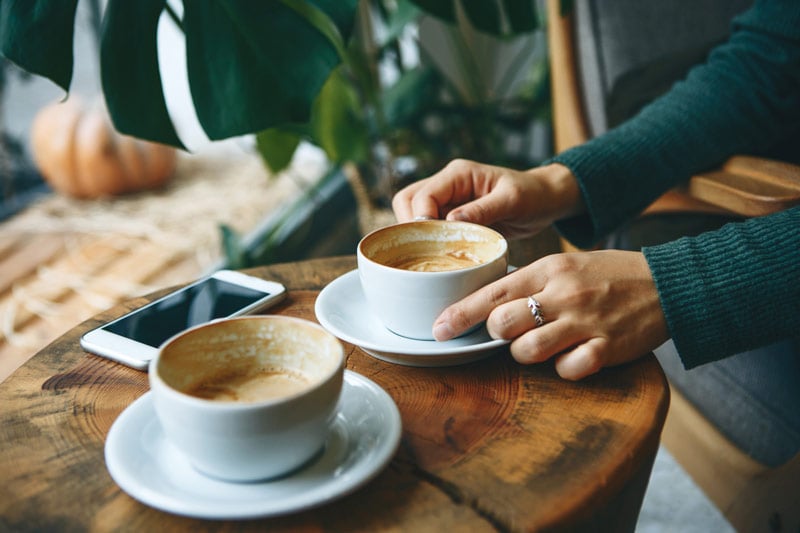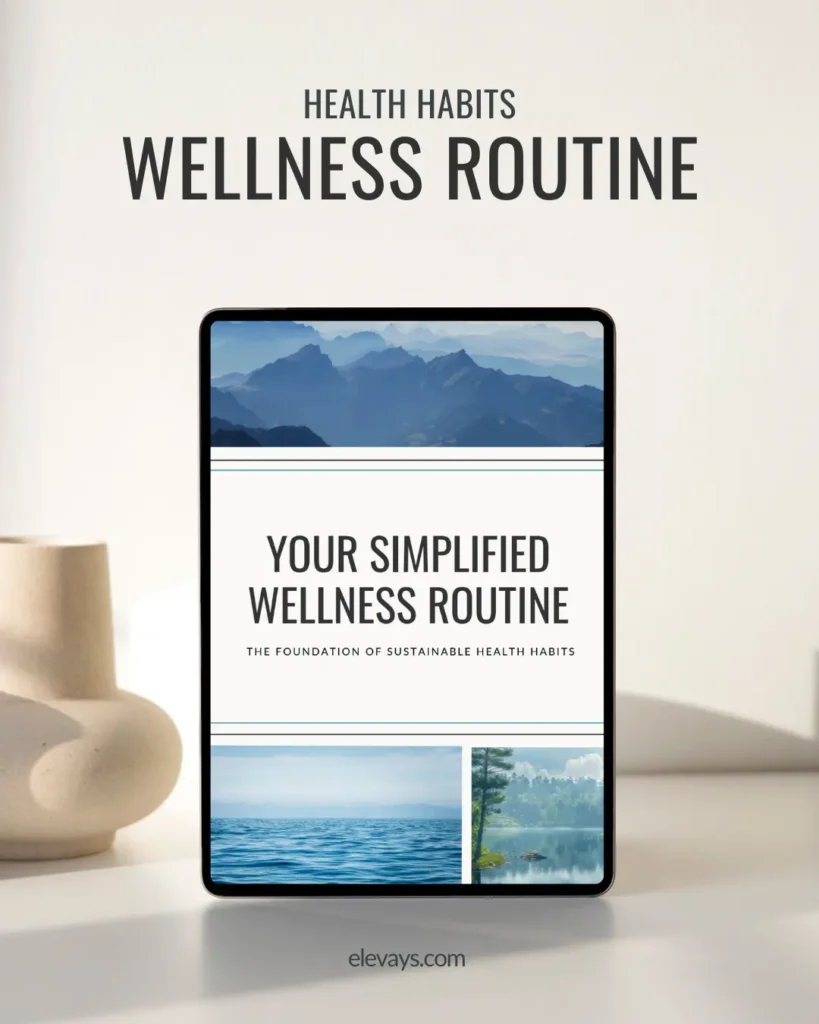Was one of your goals this New Year to quit caffeine? You’re not alone in this endeavor. More and more women realize that their morning latte is no longer serving their highest energy and best selves. Anxiety, digestive issues, fatigue, and acne, are some of the complaints that I see linked to caffeine. In this article, I’m sharing 5 reasons why you should quit caffeine and what to do instead.
5 Reasons Why You Should Quit Caffeine
1-Dehydration
I hate to get started on the wrong foot, but coffee dehydrates you! Most of us these days wake up, and the first thing to go into our bodies is a cup of coffee. The caffeine from that cup of coffee has mild diuretic effects on the body, stimulating your kidneys to flush extra sodium and water from the body. Not only can that be dehydrating (and cause loss of essential minerals), but it also fails to give your body what it truly needs first thing in the morning: a big glass of water.
After a long night’s sleep, the body is ready for replenishment. Sixteen ounces of water right when you wake up will give you more energy than your cup of joe (stay tuned for more info on this!). The water will help rev up your digestion, detoxification, and brain function to help you get started on the right foot.
TRUTH BOMB:
You’re
Already killing it!
If You Were More Consistent With Your Wellness Routine, You’d Be Unstoppable.
The thing is, 75 percent of Americans are chronically dehydrated and don’t even know it. Dehydration can lead to brain fog, fatigue, poor digestion, cravings, headaches, and skin problems—all symptoms that make you want to get a cup of coffee!
Getting at least half of your body weight in ounces of water per day can help these symptoms and might even reduce your craving for caffeine! If drinking plain water is hard for you (it used to be for me!), try a sugar-free electrolytes powder like our Hydration Superfood Energy powder. Not only will it provide ultimate cellular hydration, but it will also give you a boost of natural energy! Oh, and it’s the most refreshing strawberry-kiwi flavor!
2-Blood sugar imbalances
What is the relationship between coffee and blood sugar? Well, it’s not a great one.
Coffee (and any caffeine for that matter) on its own can mess with blood sugar balance. And blood sugar imbalances = unhappy hormones. If black coffee is your go-to breakfast, your hormones are not happy about it.
Here’s why: the caffeine in coffee on an empty stomach elevates stress hormone (cortisol and epinephrine) levels leading to blood sugar spikes. When your blood sugar is spiked first thing in the morning, it’s super hard to balance it throughout the day. Welcome to the rollercoaster that is blood sugar imbalance and hormone havoc.
Other bodily functions get put on the back burner when stress hormones are chronically high. Think adrenal and thyroid function, proper digestion, brain function, etc. You may also be experiencing troubled skin. Blood sugar imbalances as a result of caffeine can lead to androgen-induced acne. If you cut out your caffeine, you’d be doing your blood sugar, hormones, and skin some serious favors.
Now, some of you might be saying, “well, what if I drink BulletProof coffee!?” And this is a fair point. One of the main reasons blood sugar levels see an impact is that there’s no fat, fiber, or protein. While including ghee/coconut oil may help, it still doesn’t eliminate the caffeine.
The fix here is to try and opt for a caffeine-free alternative. This can look like a delicious mushroom and adaptogenic vanilla honey latte. Our Beauty Collagen Complex is my morning must-have. Packed with adaptogens like Schisandra and ashwagandha, and protein for balanced blood sugar. I look forward to it every single morning. And so does my skin.
3-Caffeine-Induced Anxiety
Is caffeine bad for anxiety? Is there such a thing as caffeine-induced anxiety? Yes and yes. In fact, holistic psychiatrist Dr. Ellen Vora categorizes coffee and caffeine as one of the culprits of ‘false anxiety’.
According to Harvard Medical School, caffeine use mimics anxiety symptoms, including nervousness, restlessness, trouble sleeping, fast heart rate, and gastrointestinal problems.
Caffeine’s jittery effects on the body are similar to a frightening event. That’s all thanks to caffeine stimulating your “flight or fight” response and dysregulating your nervous system. One study even found that excessive caffeine consumption leads to symptoms similar to psychiatric conditions, including anxiety, sleep disorders, and even increased hostility.
If you struggle with anxiety and nervousness daily, try going without caffeine for a week. At first, it may be challenging, and you may experience withdrawal symptoms if you are a chronic consumer, but the results will be worth it.
4-Increases Stress & Worsens Adrenal Fatigue
At its core, stress is a physiological response. And caffeine stimulates the stress response.
Caffeine causes neural excitation in the brain. Your hypothalamus tells your pituitary gland it’s an emergency that tells your adrenals to release stress hormones like cortisol. This is why it’s not uncommon to have digestive problems, sweating, clammy hands, nervousness, and anxiety (also a physiological response) after drinking coffee/caffeine.
Chronic consumption of caffeine and coffee really takes a toll on your adrenal glands—as well as a toll on the entire HPA axis, which, when dysregulated, is at the root cause of adrenal fatigue.
Just remember this: the adrenals and caffeine don’t have a good relationship. If you are already dealing with common adrenal fatigue symptoms, it’s absolutely essential that you take a caffeine break. Some common symptoms of adrenal fatigue include:
- Difficulty getting up in the morning
- Chronic fatigue not helped with sleep
- Craving salt or salty foods
- Inability to handle stress
- Increased effort to do everyday tasks
- Lethargy, lack of energy
- Low libido
- Mild depression, anxiety
- Light-headed when standing up
- Increased recovery time from illness, injury, or trauma
- Less enjoyment or zest for life
- Increased PMS
- Symptoms increase if meals are skipped or not balanced
- Brain fog
- Memory problems
- Irritated easily
- Afternoon slump around 3pm
- Feel wired, energized after dinner
- Insomnia
The fix here is to opt for herbs, and adaptogens that help tamp down stress and support natural energy levels. I am obsessed with herbs like maca and cordyceps for energy, while ashwagandha and Schisandra are my go-to’s for tamping down stress and balancing hormones. Both of which are found in our delicious vanilla-honey Beauty Collagen Complex.
5-It doesn’t actually give you energy
What’s the point then, right? Ok, ok, I get that a lot of people love the ritual of coffee, the smell of a freshly brewed pot in the morning. But when it gets to the point when you feel like you can’t function or go on without it, that’s a problem.
Your body uses ATP (adenosine triphosphate) throughout the day to create energy. A by-product of that process is adenosine, a central nervous system modulator that makes the body feel tired. When adenosine binds with brain receptors, brain activity slows, signaling to the body that it’s time to rest.
Here’s how caffeine works: caffeine is molecularly similar to adenosine and binds with these receptors, which blocks your brain from receiving signals to feel tired! The effects typically last 4 to 6 hours until your brain receptors are flooded with adenosine leading to the crash!
A recent study found that while a cup of coffee can push you through the day, allowing you to do the bare minimum just to make it, it doesn’t actually help you get back on track. Coffee and other caffeinated drinks just give us the impression that we have energy and brain clarity, according to researchers at Michigan State University.
The study looked at more than 275 individuals who had gone without sleep and then consumed caffeine or a placebo. 200mg of caffeine (~2 cups of coffee) was delivered via capsule. Participants were then asked to perform a basic task and then a more challenging task with multiple steps to be completed in order and no skipping or repeating steps.
The study found that the lack of sleep worsened overall performance in both tasks. Caffeine was not enough to help participants complete the challenging tasks.
Basically, your cup of joe or caffeine muse isn’t doing you any favors in the energy and brain function department.
What to Do Instead
I’m not saying that you need to cut out caffeine and coffee completely forever, but I am inviting you to experiment with a break! If you are struggling with hormonal imbalances or adrenal fatigue, I highly recommend taking a break and opting for natural alternatives. Our Hydration Superfood Energy is amazing for natural energy, ultimate hydration, and gentle detoxification. Our vanilla honey Beauty Collagen Complex will be the easiest replacement for your morning latte and offer nervous system and stress support for happy hormones and adrenals.





READ the Latest
Health Habits
Health Habits
Longevity
Longevity
One Comment